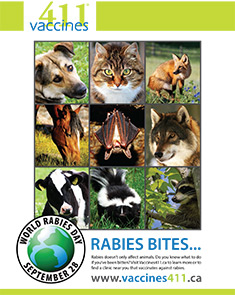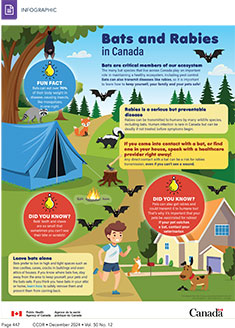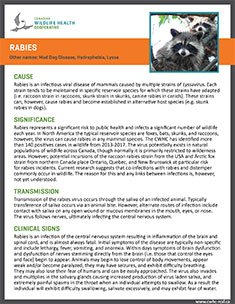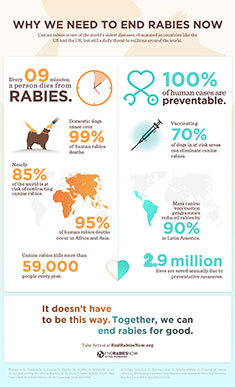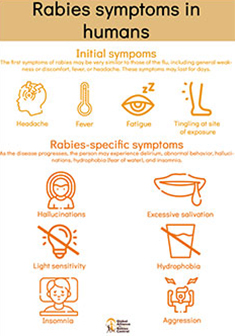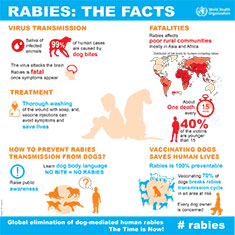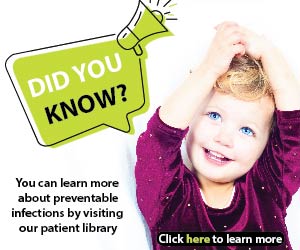Rabies - Awareness is your family’s best protection
Rabies must be treated early – before symptoms develop – or the disease is fatal.2 Although infection is relatively rare in humans, about half of those who do contract rabies are children under the age of 15. Vaccination to prevent rabies infection before exposure is reserved for people at high risk of contact with the virus, either because they work with animals or they’re travelling to areas with a high risk of rabies...  read more.
read more.
Rabies doesn’t only affect animals. Do you know what to do if you’ve been bitten? In addition to over 1,500 clinics administering the rabies vaccine on Vaccines411, we have gathered a list of reliable resources on rabies. Click on the links below to answer your questions on how it is contracted, who is at greater risk of contracting rabies, what signs to look for, how it can be prevented etc.
When you are done, make sure to find the clinic nearest you offering the rabies vaccine by entering your postal code in the search box above, and selecting the "travel" category.
Rabies Resources:
Articles:
- A Midsummer Night’s Warning: Everything You Need to Know About Rabies Prevention Vaccines411
- The great outdoors: Safety first against its foes Vaccines411
- Rabies - Awareness is your family’s best protection Vaccines411
- Here's what you need to know about rabies CBC
- Rabies in Ontario - What should we do? Ontario Association of Veterinary Technicians
- 8 things you may not know about rabies - but should Elsevier
Tips & Tools:
- Fact Sheet: Rabies WHO
- Rabies: OSH Answers Government of Canada
- Rabies CDC
- Rabies in Humans Gouvernement du Québec
- Rabies: treatment & symptoms Government of Canada
- Can rabies be eliminated? Global Alliance for Rabies Control
Featured Resources:
- Rabies: Prevention & risks Government of Canada
- Rabies vaccines: Canadian Immunization Guide Government of Canada
- World Rabies Day WHO
- When to Seek Medical Care for Rabies CDC
- Global Rabies: What You Should Know CDC
- What is rabies? World Organisation for Animal Health
Media :

The Ottawa Hospital
Infographics/Fact Snacks:
This list of resources is in no way complete, if you have a resource link which should be included on this page please contact us at ac.114seniccav@troppus.
This information should not be used as a substitute for the medical care and advice of your doctor. There may be variations in treatment that your physician may recommend based on individual facts and circumstances.




